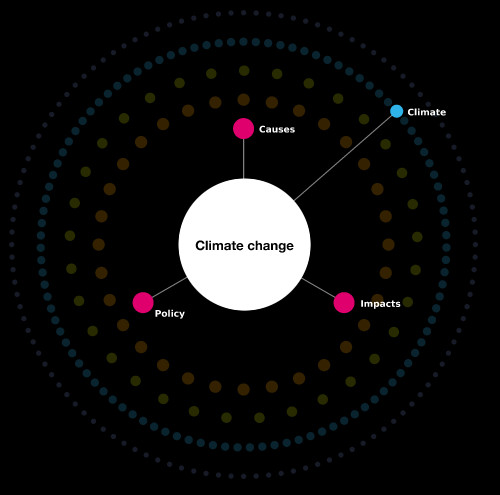This exciting new interactive tool is for curriculum developers and other communicators to explore the diverse range of concepts associated with climate change and the links between them.
Which aspects of climate change are well covered by a proposed curriculum, where are there gaps, missed links, duplication or inadequate progression?
We’d love to hear back from you if you use the tool, or if you spot missing concepts or links – please email the Society.
There is a glossary of all the terms in the tool, and we have started tagging all the climate change teaching resources on MetLink so that they link well to the terms and concepts in the tool.
It’s a work in progress and we look forward to further developing the functionality and support through 2024.
For example, you could start with the term action, which serves as the primary catalyst for change. Action, in this context, depends on normative feedback, reflecting social influences based on expectations and values. This relationship leads us to the concept of society where communities influence and are influenced by actions, policies and norms. At the heart of society are individuals, whose actions are shaped by factors like scepticism or indifference. The collective actions of individuals drive societal change, representing a transformation in norms, values and behaviours. Importantly, this change can yield co-benefits extending beyond climate stability and delivering broader social and ecological benefits. These concepts are all rooted in the overarching goal of sustainability, aiming to improve well-being for current and future generations.
However, much of society and industry is bogged down in greenwashing where claims of responsibility don’t align with actions. To achieve meaningful change, we must identify solutions including innovations and guidelines that promote positive action while discouraging harmful practices.These solutions are intricately linked to policy encompassing regulations, laws, and taxes that steer societal change. Effective policies and actions depend on individuals, organisations, and governments taking responsibility for the future. The success of our collective efforts hinges on effective communication compelling the world to recognise the necessity for change. Additionally, we must acknowledge and engage with barriers to action spanning cultural, social, political, economic, technical and legal obstacles.
These concepts represent just one interconnected web of issues.

